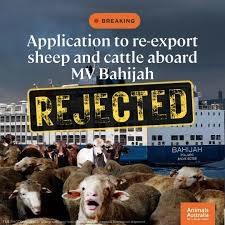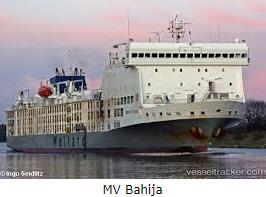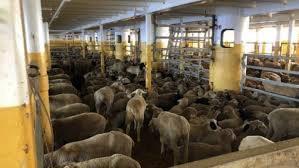
For many decades, Australia ranked 7th among exporters of live cattle and sheep has supplied Indonesia and Middle East nations with up to half a million sheep and cattle annually valued at $100 million. This has exposed animals to extreme stress and losses during ocean transport. The only justification for this trade is the demand for local slaughter in importing mations. Halal requirements could be met in producing nations with supervised processing as with poultry.

Attacks on merchant shipping in the Red Sea have highlighted the welfare problems associated with prolonged transport of live animals. Disruption in passage through the Bab al-Mandab Strait has stranded cargos. It is estimated that there are more than 100,000 ruminants currently on the water en route to Jordan, and other Middle-east nations.
On Monday February 5th The Government of Australia refused permission for the MV Bahija carrying 1,500 cattle and 15,000 sheep to re-commence a voyage after a previous departure on January 5th. The vessel returned to Australia and will now have to unload the animal cargo into quarantine after 30 days at sea.
Although Australia has imposed a code of practice regarding export a number of incidents involving suspension due to unacceptable handling and slaughter have occurred. These include Saudi Arabia in 2003 and 2005, Indonesia in 2012 and Egypt in 2013.
Intercontinental shipment of ruminants is an anachronism and is unnecessary given that refrigerated transport of mutton and beef is an acceptable alternative. The Government of Australia could be forced to end large-scale ocean shipments of live animals given the growing antagonism towards this aspect of agricultural trade, especially over extended distances. Voyages in excess of 30 days necessitated by circumnavigating Africa from Australia to the Middle East are unacceptable given the difficulty of feeding and watering large ruminants and to allow exercise and an environment conducive to survival.
given that refrigerated transport of mutton and beef is an acceptable alternative. The Government of Australia could be forced to end large-scale ocean shipments of live animals given the growing antagonism towards this aspect of agricultural trade, especially over extended distances. Voyages in excess of 30 days necessitated by circumnavigating Africa from Australia to the Middle East are unacceptable given the difficulty of feeding and watering large ruminants and to allow exercise and an environment conducive to survival.